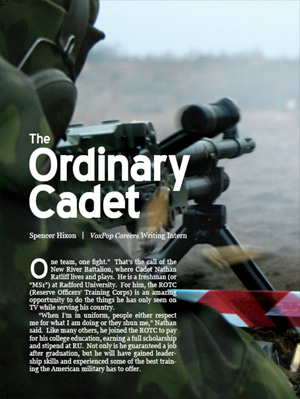VOXPOP: The Ordinary Cadet
By VoxPop Careers Writing Intern Spencer Hixon
Excerpt from VoxPop Careers Magazine, pick up your copy next week in SUB I room 204
 One team, one fight.” That’s the call of the New River Battalion, where Cadet Nathan Ratliff lives and plays. He is a freshman (or “MS1”) at Radford University. For him, the ROTC (Reserve Officers’ Training Corps) is an amazing opportunity to do the things he has only seen on TV while serving his country.
One team, one fight.” That’s the call of the New River Battalion, where Cadet Nathan Ratliff lives and plays. He is a freshman (or “MS1”) at Radford University. For him, the ROTC (Reserve Officers’ Training Corps) is an amazing opportunity to do the things he has only seen on TV while serving his country.
“When I’m in uniform, people either respect me for what I am doing or they shun me,” Nathan said.
Like many others, he joined the ROTC to pay for his college education, earning a full scholarship and stipend at RU. Not only is he guaranteed a job after graduation, but he will have gained leadership skills and experienced some of the best training the American military has to offer.
- Pick up your copy of VoxPop Careers next week in SUB I Student Media Office, room 204
There is a cost, however, for these many benefits. After he graduates, Nathan must take part in basic training,
and then serve in active duty for four years. Once those years are over, he is obliged to serve an additional four years on either active or reserve duty. This means that he won’t be out of the Army for at least another 12 years. If Nathan wishes to pursue graduate school the Army will pay for that as well, but only in exchange for two years of service per paid year of grad school. But this doesn’t intimidate Nathan. In fact he is considering remaining with the army and pursuing a military career, which will earn him a pension— but only after 20 years of service. Nothing comes without a price, and the benefits of a military career are no exception.
ROTC provides military classes for the cadets that supplement their traditional education and teach them the skills they need for a future in military service. ROTC cadets also take typical college classes within their chosen
major and graduate with their fellow students. Nathan’s major is psychology, and he works hard to excel in his courses. Social psychology is his main interest, and one that may also help him in his military career where he hopes
to become an intelligence officer. With a high enough GPA, he may be permitted to take specialized courses over the summer such as skydiving (or “jump”), northern warfare, or air assault.
How many of your friends can say they’ve repelled out of a helicopter?
Despite his military training, Nathan is a typical college
freshman in many ways. He studies, has plenty of free time, and likes to hang out with friends at “The Bonnie,” home of Radford’s popular pool and game room. Photography is a beloved pastime of his, as is fishing at nearby Claytor
Lake and range shooting in Jefferson National Forest. Unlike
other freshmen, however, Nathan faces the harsh realities of a career in the military. Someday his job might require him to answer the question: Kill or be killed? Although most jobs in the Army are support roles and never see action, there is no guarantee that Nathan won’t end up in direct
line of fire.
“It’s all part of life, part of the job,” he said serenely. “Do what you need to do to stay alive.”
However, just because someone in the Army might never see
combat doesn’t mean they won’t be affected by it. Ryan Proctor, a 42-year-old student at George Mason University, participated in Desert Storm back in 1991. He drove trucks filled with beams and personnel to the front lines, and drove those same trucks filled with recently released prisoners of war back to the base. Although he never saw combat, he has nevertheless been affected by the stress of a war environment. On the very first night he spent in Saudi Arabia as a 24 year-old recruit, his platoon was put on alert due to the threat of SCUD missiles. Every night he went to sleep with the rumble of distant artillery in the background.
“When you’re on a bus with 50 POWs and only three of you have a weapon,” Ryan says, “the stress starts to get to you.”
The thought of having to kill someone was, in his mind, the worst thought in the world. “I would not wish war on my worst enemy,” he added.
In 2003, Ryan was hospitalized due to flashbacks after seeing coverage of the Iraq war on TV that was all too familiar. To this day he cannot see fireworks without horrible memories flooding back into clear focus.
But Ryan did find something greater out of his experience.
“Everything you hear about life-long buddies is true,” he said happily. He found a friend whom he trusts with more than just his life. The two have given each other power of attorney—something that his friend’s wife doesn’t even have.
Undoubtedly, Nathan will not have the same experiences as Ryan. He may never be subjected to the same levels of stress
or the possibility of having to kill someone. He may handle stress differently than Ryan and not be as affected by it. But regardless of what the future holds, right now Nathan is just an ordinary college kid making extraordinary choices.
And choosing to serve his country with a career in the Army might be one of them.

